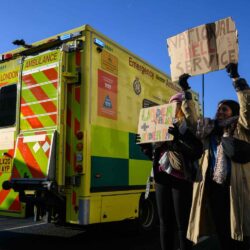Ambulance strikes today: What you need to know
Monday’s ambulance strike will see thousands of workers in England and Wales walkout – including paramedics, control room staff and support workers in a dispute over pay.
The NHS has warned the public to only call 999 if you are seriously ill or your condition is life-threatening.
Which ambulance staff are striking?
Thousands of members of the Unison, GMB and Unite trade unions are striking on Monday across much of England and Wales, although the East of England will be unaffected.
Unison members are striking in five regions: London, Yorkshire, the South West, the North West and the North East.
Around 2,600 Unite members are expected to walk out in England’s North West, the West Midlands and the North East – a further 1,000 will walk out in Wales.
About 1,000 GMB members are striking in the West Midlands for 24 hours.
The start times and lengths of the walkouts vary between ambulance services, but most will last around 12 hours.
Hospital staff strike:
Unison members at two Liverpool hospital trusts will also be walking out on Monday in a dispute over pay, at Liverpool Hospitals NHS Foundation Trust and the city’s Heart and Chest Hospital.
The strike will include NHS staff except doctors, so staff such as porters, assistants and midwives.
What do I do if I need an ambulance?
NHS England says priority will be given to those with urgent health needs.
- Call 999 If you are seriously ill or injured, or your life is in danger
- For all other healthcare needs, contact the 111 helpline, your local GP or pharmacy
- Attend appointments as planned. The NHS has said it will contact anyone whose appointment has to be rescheduled due to the strike
The NHS’s Charlotte McArdle said: “It is important that people continue coming forward for treatment, whether it is 111 online… or calling 999 in a life-threatening emergency.
“While strikes will impact some services in those local organisations taking action, NHS teams have worked hard to maintain routine care as much as possible.”





